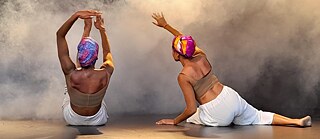Khadidiatou Bangoura & Luana Madikera
Dance as a means of research

What happens when you take traditional cultural practices out of their context and show them on stage? What does it take for this to happen respectfully and attentively? A portrait of the dancers Luana Madikera and Khadidiatou Bangoura, who are researching these questions together in Montreal.
By Elizabeth Luft
Luana Madikera and Khadidiatou Bangoura look at the screen with obvious satisfaction. They have finally arrived in Montreal and have big plans for their six-week residency in Canada. “The starting point for us was a project in Berlin about a cultural practice from the Kroboland region of Ghana that celebrated a girl's transition to womanhood,” says Bangoura. That was in 2023, when the two artists met at a dance platform for African, Afro-diasporic and European dance makers. “We asked ourselves what happens in such practices and, of course, whether there is anything similar in our biographies or in the countries we come from.”
Both grew up in France before coming to Germany. “My family comes from Liberia and Guinea in West Africa,” says Bangoura. “For me, it's the Caribbean islands of Guadeloupe and Martinique,” says Madikera, “where my West African ancestors were deported to”. A large part of the original Afro-Caribbean culture was lost in the process, which she tries to discover and understand in her artistic practice through music and dance.During their joint research, the two quickly realized that many questions needed to be asked: How do you transfer cultural practices respectfully? Should this be done at all and for whom could there be added value? In Montreal, they want to extend these considerations to ceremonies in other African countries and investigate whether there is a way in which the original material can be carefully and thoughtfully incorporated into creative processes.
Dancing was never a hobby for me
In Paris, Lisbon and London, she got to know urban dance styles from Ghana, Angola, South Africa, Congo or Côte d'Ivoire and soon began teaching modern Afro fusion classes herself. She became a member of the One Vibe dance school and Co-founder of the tropical bass band La Byle. “We all come from Brazil or the Caribbean and have one foot in Berlin,” she says. Their music is heavily influenced by hip hop, baile funk and Afrohouse, and they sing in Portuguese, English, Kreyol, French and German.
In 2022, she completed her first professional dance training with the Advanced Dance Program at Studio 29 in Berlin, where she learned about Eurocentric styles such as jazz, ballet and contemporary. In 2023, she continued her training with the “Diaspora Africa” at the renowned École des Sables in Senegal, an international center for traditional and contemporary dances from Africa and the West. According to Madikera, she would now also describe herself as a contemporary dancer, with projects at the Deutsche Oper Berlin, the KW Institute for Contemporary Art Berlin and Kampnagel in Hamburg.
This is where the two artists complement each other in their research, as Khadidiatou Bangoura has been making a name for herself as a dancer and choreographer in Cologne's independent dance scene for four years. She found her way to professional dance in London, where she studied International Relations and Development Cooperation “to contribute to the progress of African countries”, as she says. The countless opportunities that the English capital had to offer in dance were fascinating and she attended dance classes with international artists. “International collaboration can certainly do good things, but it was then that I realized there were other ways.”
Everyone has their own body language
In Montreal, Madikera and Bangoura want to find out how their artistic and political positions change as a result of their research and how this affects their art. They want to question and examine the concept of ritual. Because this word is associated with a valuation that exoticizes and demonizes cultures and portrays spirituality as something negative. “These images are relics of colonialism that were intended to destroy entire cultures. So the question for us is: what words are there to describe these ceremonies, these dance and musical practices, without judging them and robbing them of their meaning?”
Dance is a suitable means of doing this because it offers the opportunity to rediscover, discover and understand one's own culture. “We can also use it to express and process our feelings, which is why I am also interested in its psychosomatic aspects,” explains Luana Madikera. Her view of dance has changed considerably over time: “I appreciate that traditional dances such as the Gwoka from Guadeloupe were created in resistance and can influence the further development of my dance practice.”
During their research in Montreal, the two dancers not only want to attend dance classes and conduct research on the level of body and movement, but also exchange ideas with other Afro-diasporic and indigenous artists on site. “Here in Canada, themes of North American history and First Nations play an important role. We are interested in finding out to what extent our questions, which are also a product of colonialism, play a role in the work of indigenous artists,” says Bangoura. The two also want to let themselves be driven by the city and discover its architecture and culture. “All of this influences and fertilizes the process and we hope that we can learn a lot. Because our feeling is that we are opening a door to something that will last longer.”